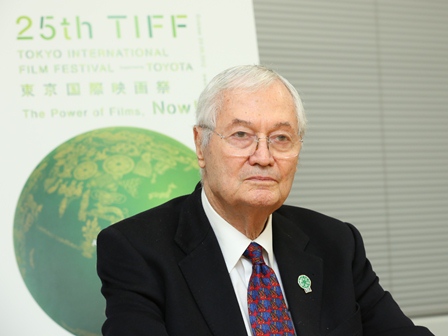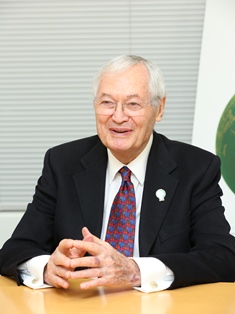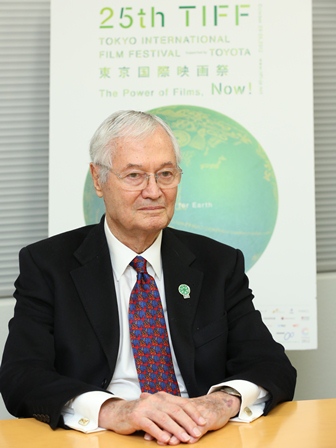Interview with Roger Corman (The president of International Competition Jury)

The 25th Tokyo International Film Festival closed with the French film “The Other Son” winning two glorious awards, the Sakura Grand Prix and the prize for Best Director. Producer-director Roger Corman, who headed the competition jury, looked back on the festival with a sense of satisfaction. “We evaluated the movies in an atmosphere of comfort and enjoyment, and made our choices for the main awards unanimously,” he said, adding that, compared to 1994, when he was on the festival jury for the Young Cinema Competition in Kyoto, he believes TIFF has matured markedly over the years, so he expects even greater things for the festival in the future.
–Could you go over the films shown in the Competition section?
Roger Corman: There were 15 nominated from a pool of submissions that numbered more than 1,000 and which depicted various countries’ respective cultures, political ideas, and beliefs
–Did you you argue a lot when selecting the winners?
Corman: I have been on many film festival juries, and this was the first time where the decision-making process was so sociable and the mood so friendly. For each award I asked the jury members to choose their top 3 films, and everyone selected the same movies. It went very smoothly. The main awards were determined unanimously. It was a unique experience.
–What was the decisive factor in choosing “The Other Son” for the Grand Prix?
Corman: The only standard for selection is the quality of the film. “The Other Son” addressed the Israeli-Palestinian problem, which has continued since 1948, in a balanced way. The film addresses not just the political background of the problem but also a sensitive, subtle subject while conveying a very simple idea, which is that all people are equal. The jury and I discussed this and we decided that the director of the Grand Prix winner did an excellent job, so it was only natural to give her the directing award.
–When you give one movie more than one award, people may get the idea you hadn’t seen that many good movies.
Corman: I don’t know about that. Gael Garcia Bernal was a strong candidate for the Best Actor Award for “No,” but the most difficult decision was the award for Best Actress. There were quite a few possibilities. But just as I mentioned earlier with regard to “The Other Son,” “Juvenile Offender,” which received both the Special Jury Prize and the Best Actor Award, described the situations of people who happen to have been born at the bottom of society and had no hope. It’s an issue that is common to all countries in the world today, but the last scene does offer some hope. That’s why both movies were unanimous decisions for awards.

–What did you think of the Japanese film “Flashback Memories 3D,” which won the Audience Award?
Corman: I really liked it, particularly the music, which was great. I’d never heard that kind of music before, or the instrument (didgeridoo). I understand that it is a native Australian instrument, and this Japanese performer became an underground star playing it. It was very interesting. It also had a lot of hope in it, because GOMA, who was in a car accident, made a comeback as a performer. Also, the 3D really fit the theme of the movie, as when the instrument seems to come out of the screen. From a technical standpoint and with regard to the background images it’s very well made.
–So what would you say TIFF needs to do in order to achieve the same status as other more famous film festivals?
Corman: I came to Japan in 1994 to be the head of the Young Cinema Competition jury, and compared to that this year’s festival was better, much more sophisticated. Many of the films were excellent, so if you asked me what the festival needs, it’s better publicity. People all over the world should know about TIFF.
–What makes for a great international film festival?
Corman: A film festival should present the cultures of different countries and show good quality movies. Personally, the kind of movie I appreciate at a film festival, even though it didn’t receive an award, was “Atambua 39 ⁰Celsius.” The reason I appreciated it is that Indonesian films aren’t yet commercially successful throughout the world, but because we’re at a film festival we can see it here. That movie showed us what’s going on in a particular society on a very simple level. But international film festivals also have movies that show what’s happening in modern societies like those in Germany and Scandinavia. What I can simply say is that the most important aspect of any film festival is that it gives movie lovers a chance to enjoy more films. And if something moves them, it’s all the better.

Interview by Gen Suzuki (Film Journalist)



















